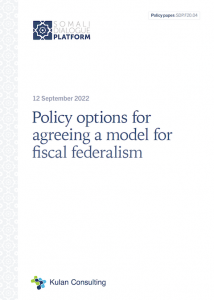Somalia first formally adopted a federal model in 2004 with the establishment of the Transitional Federal Charter. Since then, it has been deepened and clarified with the adoption of the Provisional Federal Constitution in 2012 and the subsequent formation of the country’s Federal Member States (FMS). This process has provided the basis for cooperation and co-existence, albeit limited, among Somali leaders and institutions.
Even so, important parts of Somalia’s federal model remain undefined, including agreement on a model for fiscal federalism—in other words, which level of government has the power to raise and spend revenue. This is a critical pillar of the federal architecture, as it ultimately defines the level of autonomy FMS will have vis-à-vis the Federal Government of Somalis (FGS). This makes it a very contentious issue, with FMS seeking to maximize their autonomy and the FGS seeking to assert greater control. The fiscal arrangement is not just about managing relations between FGS and FMS institutions, however, and has broader implications for Somalia’s economic development. Fiscal policy can have huge impacts on economic growth, internal trade and competition, and the quality of service delivery. Moreover, it is critical to managing inequalities between groups and geographies.
This state of affairs presents a major challenge to Somalia’s political trajectory. Competition between different levels of government over revenue sources can lead to conflict and political instability. Given the inequalities of the current arrangement, this may provoke further grievances between different groups, undermining critical development objectives. Local government, which is seen as a key pillar of peacebuilding and democratic governance, will be unable to play this role if there is no route allowing this tier of administration to become fiscally sustainable.
Clarifying fiscal arrangements is therefore not only critical but will require extensive political dialogue. This paper seeks to support political processes that can address this lack of consensus by outlining and analysing options for fiscal arrangements within Somalia’s federal model. It is intended to inform and encourage political dialogue among both Somali policymakers and the wider public, and is accompanied by a series of other options papers on contentious aspects of the country’s political settlement, including distribution of powers, Mogadishu’s status and the security architecture. The product has been developed in consultation with a range of technical experts and political influencers as part of the Platform’s ‘F20’ initiative, which collaboratively explores solutions to contentious issues in Somalia’s political settlement.




